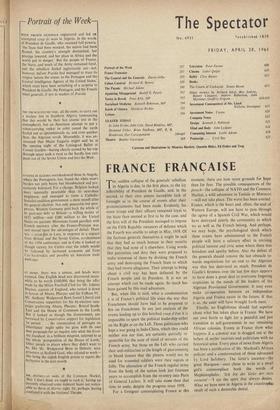— Portrait of the Week— FOUR FRENCH GENERALS engineered and
led an attempted coup de main in Algeria. In the words of President de Gaulle, who assumed full powers, 'the State had been mocked, the nation had been flouted, the country's strength diminished, her prestige lowered, and her place in Africa and the world put in danger.' But the people of France, the Navy, and much of the Army remained loyal, and the rebellion fizzled ingloriously out—not, however, before Pravda had managed to trace its origins 'across the ocean, to the Pentagon and the Central Intelligence Agency of the United States.' which must have been something of a surprise to President dc Gaulle. the Pentagon, and the French rebel generals. if not to readers of Pravda.
*
I HE FRENCH FOUND TIME, all the same, to carry out a nuclear test in Southern Algeria (announcing that this would be their last atomic test in the atmosphere), but an American attempt to put a robot-carrying rocket in orbit round the earth fizzled out as ignominiously as, and even quicker than, the Algerian revolt. Meanwhile, it was an- nounced that Major Gagarin might well be at the opening night of the Leningrad Ballet at Covent Garden—having clearly earned by his trip through space such a treat as the hardly Jess rare Jaunt out of the Soviet Union and into the West.
EVENTS IN ALGERIA overshadowed those in Angola, where the Portuguese, too, found the white man's burden not only heavy but bloodstained and pre- cariously balanced. For a change. Belgium looked more internally peaceable than its next-door neighbour, and managed to form a Catholic- Socialist coalition government. a mere month after the general election. Not only peaceable but pros- perous. Western Germany paid back the whole of its post-war debt to Britain—a trifling matter of £67} million—and f200 million to the United States on account. Historians found parallels with French recovery after the Franco-Prussian war, and mused upon the advantages of defeat. There was a cease-pre in Laos, in response to a request from Britain and the Soviet Union, co-chairmen, 01 the 1954 conference. and in Cuba it looked as though victory for Castro over the rebels would be followed by increased economic aid from ze -hoslovakia and possibly an American trade emb AT HOME, there was a census, and heads were counted. One English head was discovered mean- while to be worth £100,000, that being the offer made by the Milan Football Club for Mr. Johnny Haynes, captain of England, who turned it down in favour of Abana, Pharpar and the Fulham FC. Mr. Anthony Wedgwood Benn found Liberal and Conservative supporters for his by-election cam- paign, preferring Abana, Pharpar, Bristol South- East and the House of Commons to the Lords. But it looked as though the Government, em- barrassed by Conservative support for legislation .t0 Permit . . . the renunciation of peerages on Inheritance' might spike his guns with its own new proposals for an inquiry into what the Even- ing Standard, in a brilliant misprint, referred to as the whole 'pomposition of the House of Lords.' Other people in places where they didn't want to be, like Mr. Wedgwood Benn in Dcbrett, were prisoners at Stafford Gaol, who refused to work— this being the eighth English prison to report dis- turbances in the past month.
MR. -MACMILLAN SAID, Of the Common Market. that 'I don't think we ought to rush it,' having ap- parently observed some indecent haste not notice- able to those of shorter sight. Or, perhaps, having confused it with the National Theatre.














































 Previous page
Previous page